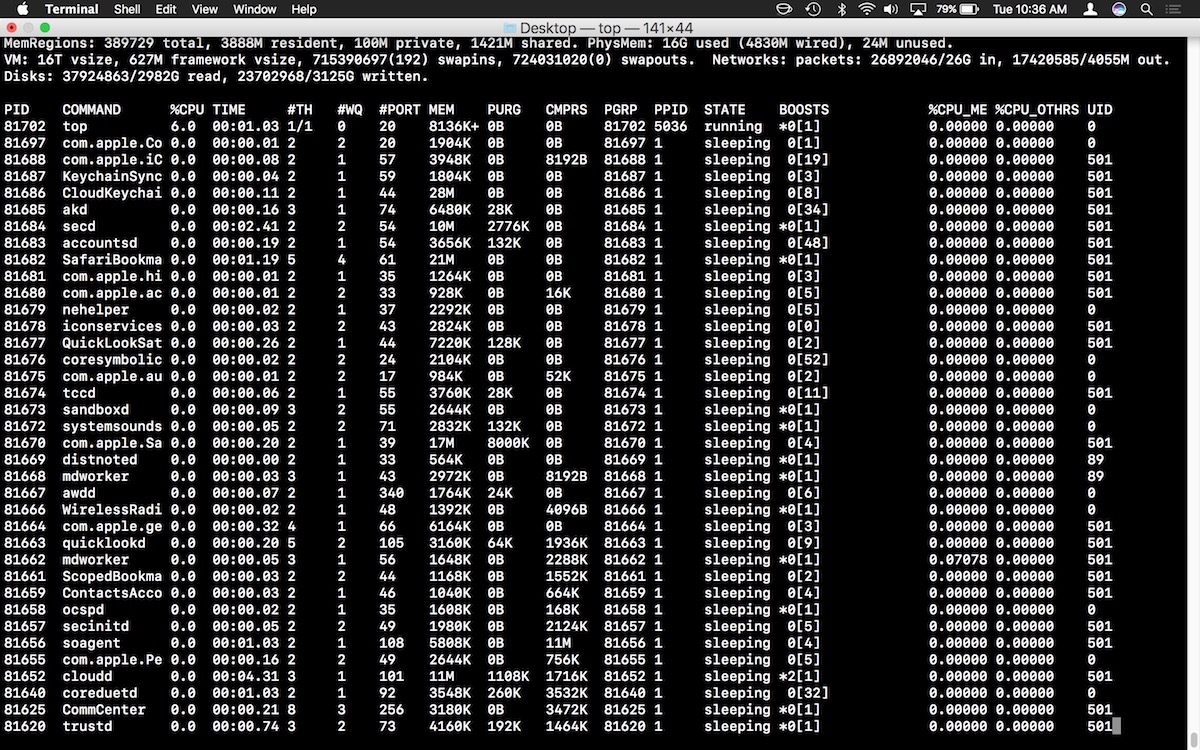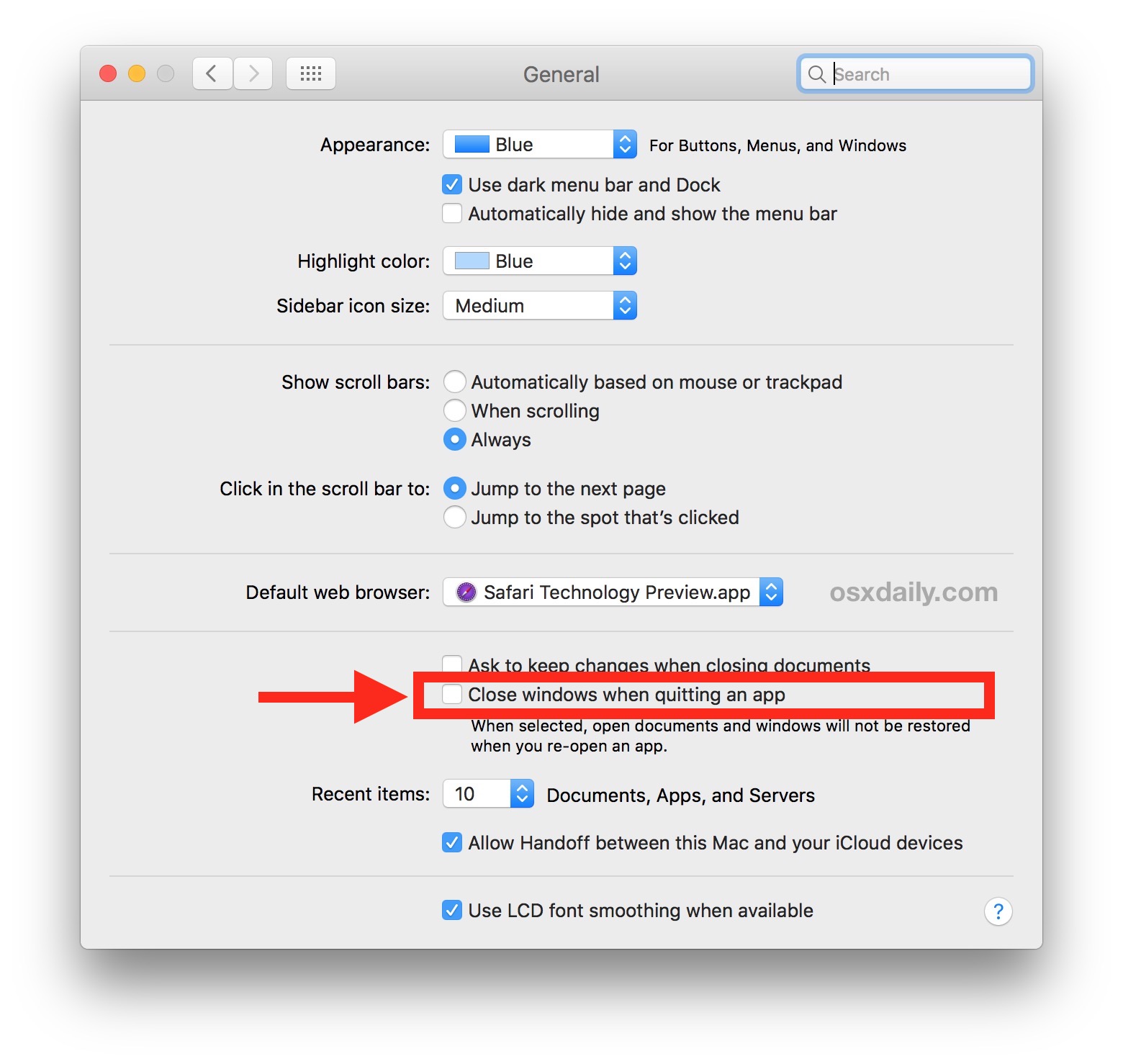How to Make Apps Open in Full Screen Mode on Mac Automatically

Some Mac users really enjoy full screen mode for apps and windows, so much so that they might want to make Mac apps open in full screen mode automatically.
While there is no system wide setting in Mac OS to make apps default to opening in full screen mode, there is a workaround trick that will allow many apps to open directly into full screen mode on the Mac.
The best way to make Mac apps default to opening in full screen mode is by changing your app usage behavior a bit, combined with an adjustment to a Mac OS system setting. The end result will be that, at least with many apps that support full screen mode, they will relaunch directly into full screen mode on the Mac. Let’s review how this workaround approach works to achieve the desired effect of launching Mac apps directly into full screen mode.
How to Make Full Screen Mode the Default When Opening Mac Apps
This is a two step process.
First, we’re going to make a settings adjustment in Mac OS system preferences that will allow Mac apps to resume their prior state they were in prior to quit.
- Go to the Apple menu and choose ‘System Preferences’ and then go to ‘General’
- Uncheck the box for “Close windows when quitting an app”
- Close System Preferences

This setting basically makes it so that if you quit an app, windows within that app will not close automatically, and instead they’ll re-open to where you left off. This setting is essential if you want some Mac apps to default to opening into full screen mode.
Second, you’ll need to change app quitting behavior. If you’re accustomed to closing all the windows of an app when or before you quit that app, you will need to stop doing that. Instead, place an app into full screen mode (like Safari for example), and when you’re done using that app, quit it while the active full screen window is still open.
- Open an app and place it into Full Screen Mode as usual (for example, Safari)
- When finished using that app, leave the full screen mode window active, even if it’s a new blank document or webpage, it must have an active full screen window left open
- Quit the app as usual, while that full screen window is active, and do not discard any open windows
- Upon relaunching that Mac app, it will open directly into Full Screen Mode by default
- Repeat with other apps as necessary
Assuming you followed the steps correctly, and you continue to quit apps while that app is still active with a window in Full Screen Mode, when relaunching the app it will be immediately in full screen mode on the Mac.
Putting it All Together: Relaunching Mac Apps Directly Into Full Screen Mode
For this to work properly, you have to follow the above sequence:
- You must quit the app while the apps primary window is still in Full Screen Mode
- AND, you must have disabled the “Close Windows when quitting apps” feature in Mac OS system settings
The system setting change is critical, because it causes Mac apps to basically resume their they left off upon relaunching. This means if you had previously enabled the “Close windows when quitting apps” feature in Mac OS so that app launching behavior is like what it used to be in older versions of Mac OS, then you’ll have to disable it.
Of course you can also just use your Mac apps as you always have, quitting and resuming whether in Full Screen Mode or not, and just get accustomed to making a window full screen on the Mac either with the use of a keyboard shortcut to enter and exit Full Screen Mode in Mac OS, a menu option, or the green button to toggle in and out of full screen mode, but that’s up to you, and obviously it won’t be automatic.
This trick works with all Mac apps that completely support Full Screen Mode in Mac OS, like Safari, Mail, Messages, Terminal, etc, but it may not work as well with some apps that aren’t designed to be used in full screen mode, and it definitely won’t work in any app which doesn’t support the feature to begin with.
So that’s the workaround to attempt to default to open Mac apps into full screen mode. For now that’s the best method to achieve that result, but perhaps a future version of Mac OS system software will offer a universal settings toggle somewhere in system preferences that allows Mac apps to default into full screen mode. There could be other options out there too, so if you know of another method of launching Mac apps directly into full screen mode, share them in the comments below!


Unfortunately, doesn’t work anymore in Sonoma. Are there any workarounds?
Yes, full screen mode is one of the worst “features” of newer Mac OSes.
The animation makes me nauseous and there is no way to disable it!
You can disable most animations on MacOS by using the ‘reduce motion’ setting in Accessibility, you can read about it here:
https://osxdaily.com/2018/12/17/how-reduce-motion-mac-disable-animations/
LaJohn,THANK YOU SO MUCH! This works!
I’ve found a way for full screen mode always. Don’t use the green button to maximize the screen… just change the size of the screen using the arrows on each edge of the screen. I have a new MacBook Pro (2020), so I’m not sure if this is a new addition to the MacBooks or not. And the screen stays in this size after closing and reopening too.
Thank you! This worked for me and the very long and repetitious description above did not.
That isn’t technically full screen. The reason some people like true full screen mode is that it allows swiping quickly between apps using four fingers on the track pad. I do most things with gestures, so it’s very frustrating when suddenly you swipe and nothing happens.
Chrome never opens in full screen, there is no way.
Yes it does, click the Green button to open Chrome in full screen mode
What I was hoping to find here is how to make apps NOT EVER open in full screen mode.
In particular, if I’m watching netflix, or VLC full screen videos on my second monitor, I DO NOT want mail ruining my movies by splitting my second screen with a split full screen display of my mailbox, shrinking the movie to half size.
It’s worse than somebody’s phone ringing during a movie.
how do I STOP THIS BEHAVIOR FOREVER?
Hi Dave,
If you’re using a second screen, just drag the Mail window to the first screen using the mouse. After sliding it into the first screen, you can also turn on Do Not Disturb, that way you don’t get notifications on any screen.
Hi Dave
You can drag the mail window onto your first screen. Additionally, you can turn on Do Not Disturb so you don’t get any notifications on any screen. If you’re having trouble with this, you can also hold the green “Maximize” button down, and select the “Enter Full Screen” option in the drop down.
Hope this helps!
So what you are essentially saying is that there is NOT a way to make all windows open Full-screen by default. You can only remember to make them full-screen yourself, not close of modify and then switch off anything else might be useful and might also interfere with how windows were previously closed. Hardly a solution or even a workable workaround is it? It would have been easier to say, every time you open a window remember to expand it to full screen.
The full screen app is remembered by the app state, thus if you make the app full screen then on relaunching that app it will be full screen again.
That’s how you make apps open in full screen mode on the Mac, there is no other way. There is no settings option or otherwise to make things always full screen.
This doesn’t work anyway. I just tried it and non of the apps behave the way as stated.
Idiotic “solution.” This means that if I close Safari with 20 webpages opened it will relaunch all 20 again, which in now way is the intended behavior desired when simply wanting to open apps full screen.
No that is not what this means. MacOS save states resume what you leave off. You can leave off with 1 tab or 200 tabs, either in full screen. You can close your tabs before you quit Safari and open it again it will be full screen with one blank window open.
What an idiotic suggestion. Close all 20 tabs first before you quit! What absolute tosh!
Mac Word did open full screen at one time and NOW it doesn’t. I managed to increase the screen size when it opens but I want it full screen. Your suggestion is completely rubbish and more than that, it doesn’t even work. I followed your steps precisely and NO CHANGE!
I had no idea this was a thing in osx. This alone will increase my productivity by a couple minutes a day because I don’t have to waste time opening certain programs in full screen mode.(Such as ones I use for coding website and editing graphics.) One question I pose to the author and/or other commenters is if there is a way to launch a program into half screen mode? Aka 50% of the screen with a vertical break.
Cheers,
Drago
Full screen is so 1999. I drop anybody as a friend if they use full screen.
Bye Felicia 😒
Strange. How many remaining friends do you have?
…didn’t work with screen sharing.
Yes, thank you too. I was unaware that this was possible.
I am not a frequent user of Mac but making the app in full screen more is one of my problems. I was used to with Microsoft Windows so switching to Mac has been quite a challenge. So thanks to your steps, really it helped!
Thanks for the tip.
Also…another thing I forgot to add…on my Mac, using Safari browser, the Facebook website did not load either…got a blank page on there…I am sure many of you use Facebook and I am sure you have experience with the not loading issues. Do you have a tip/advice/information on what I need to do with any not loading issues??? Please HELP!!! Thanks again! That is why I subscribe to this OSX Daily newsletter for any tips/advice/information, etc…
Hi. I am having some issues with my Mail Apps on this laptop computer and on my iPhone 4. I have both Safari browser. Both by Apple. On my iPhone and on my regular email via http://www.aol.com I changed to a new password. On my regular email I am able to receive and send emails from there. On my phone, though, I am able to receive and read emails after I put in a new password, the same one from the browser on my laptop. I have the Mail App on my computer as well but it won’t accept my new password, saying my username and password don’t match,or something like that. On my phone I changed the password, able to receive emails but not send out because of the IMAP/POP issue. I do not understand. I hope you know what I am talking about. I hope there is a expert out there who will explain in details on how to fix it for me. Thank You!